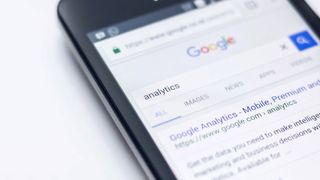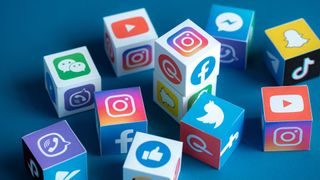Marketing 101: marketing basics for small business owners
Get the lowdown on Marketing 101: what you need to know

How well do you know your marketing basics? As a new business owner, it's likely not the top of your list of skills to refresh or learn, but it should be an important one. After you've just launched a new business, created the perfect products and services, built your website, and worked out how you're going to serve your customers with the help of the best CRM software, you'll need to think about how to keep growing your business via strategic marketing.
In this article, we'll be answering questions like: How do I get my brand's message out there? Which is the right marketing channel to reach my target audience on? How do I advertise my website? How do I encourage customers to buy?
It's all about small business marketing basics. In this "Marketing 101" guide, we'll walk you through these key areas:
- Understanding why you need to market your website and business
- Figuring out the main marketing channels and if they're right for you
- Finding the best tools and software to enhance your marketing
- Doing your marketing yourself or working with an outside company
- Tracking your results and tweaking your approach
You'll learn how to get your message out to people who need your products and services. The best part? Marketing isn't just for big companies with huge marketing departments. With the right strategy, planning, and tools, you can do it yourself—and get fantastic results.
Let's get into it.
Marketing 101: Why you need to market your business and website

What is Marketing?
Marketing is the way that you create awareness of your products and services, communicate the features and benefits, and get people to buy from you. You can achieve this in many different ways, depending on who your customers are, your business niche, what you sell, and if you want to market locally, online, or a combination of the two.
Are you a pro? Subscribe to our newsletter
Sign up to the TechRadar Pro newsletter to get all the top news, opinion, features and guidance your business needs to succeed!
You need to market your website and business for one simple reason: people don't know that you exist—yet. Good marketing puts your business, products, and services in front of the right people, with the right needs, at the right time.
The best marketing approach depends on several factors, including how much money you have available, your business niche, the best channels for reaching potential customers in that niche, and whether you want to do it all yourself.
With the right combination of marketing software and tools, you can start marketing today. Then, as your business grows, you can decide to outsource your small business marketing needs to specialized agencies.
Overview: the best marketing channels for small business and medium size business owners

The best marketing campaigns use multiple channels to maximize your reach and effectiveness. Marketing channels are the tools you use and the path you take to get your message out there.
Your business is unique, so what works for one business won't necessarily work for another. Before you start planning your marketing campaign, it's important to understand the main marketing channels, their advantages and drawbacks, and how they can help you reach your customers.
Keep in mind that a big part of marketing is choosing the best channel for reaching your potential customers. These channels can change from product to product, so it's a good idea to experiment and see where you can optimize your return on investment.
The main online marketing channels are:
- Pay-per-click advertising
- Display advertising
- Social media marketing
- Content marketing and SEO
- Email marketing
Pay-per-click advertising on Google

Google Adwords is a pay-per-click advertising tool, and can be a very effective marketing channel for small business owners. You bid on keywords, and when people search for those terms on Google, your ads have a chance of showing up. If a user likes your ad, they click on it and are sent to your website. Google charges you each time someone clicks your ad.
Advantages of pay-per-click
- You're only charged when someone clicks your ad, and it's easy to adjust your bids and budgets to reflect what you're willing and able to spend
- PPC is great for seeing fast results—sometimes as soon as a day or two after you launch your marketing campaign!
Disadvantages of pay-per-click
- You need to track your marketing budget very carefully, as it's easy to overspend on Google Adwords
- It does take time to set up and manage a Google Adwords account
The best marketing software and tools for pay-per-click marketing
Google Adwords and Google Analytics are the two most effective tools for managing your PPC campaigns.
Display advertising for your small business

Online display advertising helps you reach potential customers as they're browsing different websites. You create ads on various websites (called "publishers"), which appear on those sites when users visit them. These ads can be text-based or graphics-based, and they can also include video clips, animations, or interactive content.
Advantages of display advertising
- You can reach potential customers across multiple different websites
- It can be less expensive than other marketing options
Disadvantages of display advertising
- Publishers control the appearance and content of the ads, so you don't always have full control over how your ads will look
- You need to find publishers for your ads, which may take time and effort
The best marketing software and tools for display advertising
- Google AdSense
- Google Analytics
- HubSpot Ad Management Software
- AdRoll
- RollWorks
- Adstream
Social media marketing for your small business

Social media marketing uses social networks like Facebook, Twitter, and Instagram to share great content with your customers. The best part about this kind of marketing is that it's highly targeted and flexible.
Social media marketing comes in a couple of different flavors:
- You can post updates on Twitter, Facebook, and other social networks that will inform your followers about what you're doing, and share helpful content
- You can pay to have your ads and posts featured in social media feeds, and target them precisely to users based on their interests and other factors
Advantages of social media marketing
- It's usually free to create and maintain accounts on major social channels like Facebook and Twitter
- You can post text updates, photos, videos, links, and more to keep your customers engaged with your business
- Small businesses and individuals often find that they get better results from their own social presence
Disadvantages of social media marketing
- It can be time-consuming to create, post, and manage a social media presence—it's also best practice to respond quickly to users' comments and messages, which may also take time away from other aspects of your day-to-day business
- Organic (non-paid) posts on social media platforms will not reach many people
- Paid posts and ads can be expensive
The best marketing software and tools for social media marketing
- Hootsuite
- Buffer
- Sprout Social
Content marketing and SEO for your small business

Content marketing and search engine optimization (SEO) help you appear in search engine results when people type in specific keywords. Content marketing means you'll need to create different types of content, such as web copy, blog posts, and white papers.
You can provide content as text, audio, video, graphics, or interactive widgets—whatever best suits your product or service.
Advantages of content marketing
- You can create "evergreen" content that helps you appear higher in search engine results
- Content marketing is designed to meet a user's needs, provide information, and solve their problems—this can build trust, and encourage them to buy
Disadvantages of content marketing
- If you can't create the content yourself, you will need to hire a freelancer or agency to create the content for you
- This type of marketing requires a significant amount of time and effort to create content that's interesting and engaging to users
The best marketing software and tools for content marketing and SEO
Email marketing for small businesses
Email marketing involves getting people's email addresses and sending them messages that inform, educate, and engage them. These messages might be directly related to your products and services, or they could offer helpful advice, different perspectives, interesting research, and other formats.
The key part of effective email marketing is building up your email address list. It's a good idea to create "lead magnets" to get people to sign up, and to put email collection forms on each page of your website.
Advantages of email marketing
- Email marketing is a very cost-effective way to engage with your audience
- You can easily track how people interact with your emails
- You can target your messages in a very precise way
Disadvantages of email marketing
- Spam filters can block emails
- You'll need a large number of subscribers to create an effective campaign
Decide whether to do small business marketing yourself or hire a marketing company

Many of the marketing tools and software platforms that we've listed are easy to learn and use. In the early days of your business, as you're just starting out, it makes sense to keep your marketing in-house. You want to keep your costs down, and you're still figuring out the best marketing channels and approaches.
As your business grows, you might want to outsource some or all of your marketing to a specialist company. There are many marketing agencies to choose from. Here are some factors to consider when deciding on the best marketing company:
- Focus on what you want to achieve with your marketing: is it branding, lead generation, product awareness, customer loyalty, investigating potential new markets, or something else?
- Consider the level of service that best suits your timeline and budget—which takes into account things like how much work you want them to do for you, and how much they charge
- Look at the agency's previous campaigns and testimonials to get an idea of their skill set
- Compare prices for different packages, so that you know what best fits your budget
Track your small business marketing results and tweak them to maximize your ROI
You will need to get measures in place so you can track how much you're spending on marketing, how effective each channel and campaign is at getting customers to your business, and how much those customers spend.
The best way to track your small business marketing results and tweak them to maximize your return on investment (ROI) is by using a marketing system like HubSpot. These types of marketing tools will monitor your social media efforts, SEO and content marketing, paid ad campaigns, and other marketing channels.
You can see what's working and what's not, make improvements, and track any changes. This will help you focus on the most effective marketing strategies, campaigns, and channels.
Experiment and try out different marketing approaches
The time to start is now. You have a great business, and you can get this right. This guide is an excellent starting point, and now it's down to you. These strategies work, and will help to boost your conversions and sales.
Don't be afraid to experiment. Your business has unique needs, products, and services. Getting your marketing right takes practice. As long as you record the channels you're using, develop a strategy, and track results, you can optimize your marketing in just a few months.
That way, you'll know that every penny you spend will create a great ROI and bring the right customers to your website.
Further reading on marketing
If you want to learn more about marketing, and are new to it all, we've outlined six small business marketing strategies that work.
Should you be wondering how you can automate marketing functions between businesses, or just in general, make sure to read our explainers answering the questions: what is digital marketing; what is marketing automation; and what is B2B marketing automation.
Paul is a professional writer who creates extensively researched, expert, in-depth guides across business, finance, and technology. He loves the challenge of taking complex subjects and breaking them down so they are easy to understand. He can quote 'The Princess Bride' in its entirety and believes the secret to good writing is Earl Grey tea.
Most Popular


